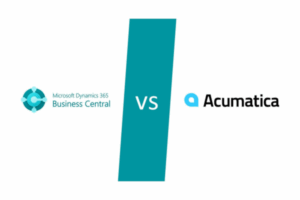What is an ERP?
Before diving deeper into the challenges, let’s first discover what an ERP system is.
Let’s start with the basics, an ERP is a computer application used by various organizations across the world. The systems primarily support business operations such as the selling process, order processing, manufacturing, distribution, planning, customer service, human resources, finance, and purchasing.
The better systems are packed with features and typically cover all of these activities. The main benefit is that the same data can easily be shared between different departments of a single organization. ERP systems are used by several industries, from healthcare to manufacturing, and even cannabis.
The systems are designed around a single, defined data structure (schema), It usually has a common database and helps ensure that the information used across the business is based on common definitions and user experiences.
These core values of the system are subsequently interconnected with business processes driven by workflows across business departments, thus connecting systems and their users. To put things in simpler terms, ERP integrates and connects people, processes, and technologies across a modern enterprise. These systems are either accessible at your place of work or are available on the cloud.
The systems are capable of managing all aspects of business with a focus on production and distribution, or both. The systems have the added benefit of tracking all aspects of tracking all aspects of production, logistics, and financials.
This helps bring a sense of foolproof transparency to the business, thus improving overall security and efficiency. The integration of the systems allows the formation of a central hub to ensure end-to-end workflow and data sharing. If the company using the systems has multiple departments, they can all access a centralized point to see data and overall performance.
6 Compliance Challenges in the Cannabis Industry + How ERP Can Help
The cannabis industry is booming, but strict regulations can make it tough for businesses to stay afloat. From seed to sale, complying with complex and ever-changing rules is a constant hurdle.
Inconsistent Regulations Across States
One of the most significant challenges for cannabis businesses is dealing with inconsistent regulations across different states. With 37 states and the District of Columbia allowing medical cannabis use, and a growing number permitting recreational use, the regulatory landscape is fragmented and complex.
In fact, medical experts have warned that the varying regulations could have dire consequences on consumer health. A 2022 study finds that the disparities pose an increased risk of contaminant exposure for immunocompromised people as they could contract potentially fatal infections. In addition, there is also the risk of confusion reigning supreme among cannabis growers, manufacturers, and testing laboratories.
Even though individual jurisdictions can implement policies and regulations, the study shows the urgent need to mitigate the public health risk posed by cannabis contamination. It identifies national-level guidelines, based on conventional risk assessment methodologies and knowledge of patients’ susceptibility in medical use, as the solution. Until then, ERPs may be the only solution.
- How ERP Can Help: The one way to help eliminate some of this confusion is for cannabis growers and/or distributors to implement a cannabis-specific ERP system that can be configured to accommodate different state regulations. These can automatically update and apply the relevant rules based on the location of operation, ensuring that businesses remain compliant across multiple jurisdictions. This feature is particularly valuable for companies operating in several states.
Strict Licensing Requirements
Cannabis businesses must navigate rigorous licensing processes, which typically include background checks, fingerprinting, proof of financial responsibility, and detailed facility and security plans. The process can be tedious and time-consuming.
Once licensed, businesses continue to face ongoing regulatory compliance costs such as product testing, record keeping, and reporting to regulators. They also have to pay specific fees and taxes.
- How ERP Can Help: An ERP system can streamline the licensing process by centralizing all necessary documentation and automating reminders for license renewals. It can also help track and manage the various requirements for different license types, ensuring that all necessary steps are completed and documented. The ERP will allow data on the associated costs to be accessible under one proverbial roof.
Seed-to-Sale Tracking
Many states require comprehensive seed-to-sale tracking to monitor the entire lifecycle of cannabis products, from cultivation to point of sale. This level of detail is crucial for regulatory compliance but can be challenging to manage manually. The tracking is essential; however, as it allows quick identification and the recall of potentially unsafe products in case quality issues or safety concerns should arise. The process ensures transparency in the supply chain and eliminates illegal or unregulated products from reaching consumers.
- How ERP Can Help: Cannabis ERPs often come with built-in seed-to-sale tracking capabilities. These systems can automate the process of recording and reporting every step of the product lifecycle, from planting to harvesting, processing, packaging, and sale. This not only ensures compliance but also provides valuable data for business operations and inventory management.
Financial Compliance and Reporting
Due to the federal status of cannabis, many businesses in this industry face significant challenges with banking and financial reporting. The cash-intensive nature of the business also increases the risk of theft and complicates tax reporting.
Even if cannabis-based businesses manage to open bank accounts, they have trouble accepting credit cards and getting loans. Some hope to fix marijuana’s banking problems with changes to federal law. Once again, they are best advised to rely on an ERP system.
- How ERP Can Help: A robust ERP system can provide comprehensive financial management tools tailored to the cannabis industry. It can help with cash management, automate tax calculations (including the complex 280E considerations), and generate detailed financial reports required for compliance. Some ERPs also integrate with cannabis-friendly payment solutions to reduce cash handling.
Product Testing and Quality Control
Ensuring product safety and quality is paramount in the cannabis industry. Many states require rigorous testing for the potency of the product, contaminants, and other factors before products can be sold.
Growers and distributors are responsible for rigorous testing to ensure that cannabis products are free from contaminants. These toxic agents can include pesticides, heavy metals, residual solvents, and microbes that could harm consumer health. Testing helps verify the potency and that a cannabinoid profile matches the label claims, thus providing consistency from batch to batch.
A strict check on quality control also allows cannabis businesses to develop new products and formulations. Once the quality of the base of their product is established, they can venture to newer products with confidence in their safety and efficacy.
- How ERP Can Help: An ERP system can manage and track batch testing processes, automatically flagging products that don’t meet required standards. It can also maintain detailed records of test results, making it easy to provide documentation to regulators when needed. Some advanced ERPs even integrate with laboratory information management systems (LIMS) for seamless data transfer. It supports the industry’s evolution from traditional flowers to more advanced delivery methods like edibles, vapes, and concentrates.
Packaging and Labeling Requirements
Cannabis products are subject to stringent packaging and labeling requirements, which often include child-resistant packaging, warning labels, and specific information about the product’s contents and potency. These requirements can vary by state and product type, making compliance a complex task. Most legal markets this packaging to be child-resistant and tamper-proof to ensure product safety and compliance. The choice of packaging used by distributors or growers ultimately depends on the specific cannabis product, the budget allocated for packaging, and their specific personal barometer for eco-friendly practices.
- How ERP Can Help: A cannabis-specific ERP can streamline packaging and labeling compliance by automating the generation of compliant labels based on product information and jurisdiction-specific requirements. They can also help track and manage packaging inventory to ensure the use of approved, child-resistant containers. ERPs can be a useful tool to Integrate with laboratory testing results to accurately report potency and other required information on labels. If tasked, they can maintain a database of current packaging and labeling requirements for different states or jurisdictions, helping businesses stay up-to-date with changing regulations across the United States. Automation is key when it comes to keeping up with the changing needs of cannabis packaging. ERP systems can significantly reduce the risk of non-compliance in packaging and labeling, which can lead to costly recalls or regulatory penalties.
Beyond Compliance: The Full Spectrum of Benefits with ERP
Now that you know how to handle compliance complexities with ERP, there are some additional benefits it comes forward with.
Fort Knox for Your Cash
Managing cash flow is an essential aspect of any venture, but if we talk about the cannabis industry in particular, federal limitations on using traditional banking services can pose a real challenge. This is where ERP helps provide useful features that help securely manage your cash while staying compliant with regulations. Now you can have a real-time, centralized view of all your transactions, helping you keep an eye on everything from cultivation costs to retail sales.
Manual record-keeping on tedious spreadsheets becomes an afterthought, saving you valuable time and resources on tracking down every single dollar spent. It also enables you to keep a vigilant track of your financial health and revolutionize your operations.
Security That’s Worth Its Weight in, Well, You Know…
In the cannabis industry, data security is paramount. Sensitive information like plant strains, inventory levels, and customer details require robust protection. ERP takes a multi-layered approach to data security. User access controls ensure that only authorized personnel can access specific data points, preventing unauthorized eyes from viewing sensitive details. Data encryption scrambles your information, making it unreadable even if intercepted.
Furthermore, features like audit trails provide a detailed record of all data access and modifications, allowing you to track any activity and maintain complete transparency. If you do experience an unfortunate data breach in your organization, the data backup options provided by ERP quickly recover your information and minimize disruption.
Wrapping Up
The legal cannabis industry has been on an explosive growth roll, but the boom is accompanied by its fair share of regulation hurdles for business owners. Between guaranteeing compliance and managing operations, cannabis businesses find themselves backed into a corner, facing challenge after challenge.
ERP systems can help manage these compliance challenges effectively, from managing seed-to-sale tracking to ensuring secure cash flow and data protection. ERP empowers businesses with features that streamline operations, boost efficiency, and unlock valuable insights for informed decision-making.
If you’re a cannabis entrepreneur who wants to break into the legal cannabis industry, consider implementing an ERP system. It can be the key to unlocking your business’s full potential and propelling you towards success within the bounds of regulation authorities.






